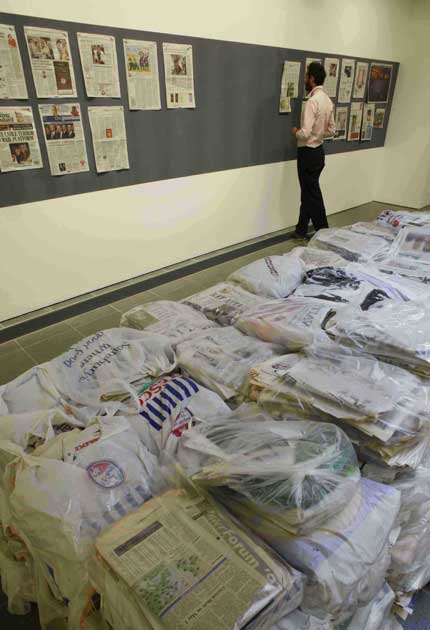Gustav Metzger, Serpentine Gallery, London
Anti-capitalist demonstrations

The name is relatively little known but, as this retrospective of 50 years of work demonstrates, Gustav Metzger was doing things in the late 1950s and early 1960s that are now almost taken for granted. He was making art out of the detritus of all our lives in order to draw attention to wanton consumerism. He was making art that would perish almost before it was made in order to question the assumption that art was some kind of monumental thing – forever set apart and above us – that had to survive us. And he was making what he called "Liquid Projections" – panels of light beamed onto walls – years before technology would, once again, bring into being an entire generation of artists who would make art out of ever shifting, ever changing, moving images.
And yet for all the left-wing politics and the feisty anti-capitalist drum-banging that underpin this show, it feels quite a quiet experience, in fact, almost a tame one.
One of its difficulties is that it gets off to a rather poor – if not lame – start. We walk in the door to be confronted by heaps of newspapers, great bundles of them, tumbling out of their shrink-wrapping. What's all this about? There is white shelving around the walls, chairs to sit at. A couple of people are there already, idly leafing through a newspaper. The instructions on the walls tell us to choose articles or images on one or another of three themes: the credit crunch; extinction; or the way we live now. "Select the relevant articles and images", it reads. Visitors may "edit, share and discuss". Then what though? Are we supposed to be making something that will add up to a collective protest of some kind or not? (There are already some articles pinned up.) It seems unclear. We drift away.
Just around the next corner we look over a series of photocopies of pages in German, extracts from the "Laws on Jews from the Third Reich", that were promulgated by the Nazis in the 30s, and we then read the translations, which tell us, amongst many other things, that Jews were excluded from all German economic life. Metzger himself was of Jewish/Polish parentage, born in Nuremberg in 1926. We feel for him, of course. We feel for all persecuted Jews everywhere. But what is new about this? And is this really anything other than gesture politics?
The next gallery is full of what Metzger describes as "Historic Photographs" – a blown-up image of Jews leaving the Warsaw Ghetto, hands held high, is displayed behind a heap of house bricks, broken and whole, to denote the physical destruction of the Ghetto. In another photograph, only visible when a light flashes on behind a bamboo screen, children try in vain to flee the horrors of Vietnam.
The central gallery contains the "Liquid Projections", five of them, each one a large rectangle, making a shifting corner of oozy light. There are cushions on the floor so that we can lie back and contemplate the projections and – if the passion seizes us – our navels. These shifting abstractions occasionally assume shapes we think we half-recognise – the feathery, ragged limbs of trees, amoebas beneath a microscope, rainbows, white ink blots. Shadows float by.
Then we pass through the curtains again and we almost collide with a beaten up Vauxhall Astra, its windows smashed out. Nearby there's an image of some kids in Camden Town in 1996, dancing on a wrecked car just like this one. And some distant chanting too: "Kill the car, Kill the car!" Just then, the early October sun beams in on us from Kensington Gardens. This is a very comfortable space in which to be feeling resolutely anti-capitalist.
To 8 November (020-7402 6075)
Join our commenting forum
Join thought-provoking conversations, follow other Independent readers and see their replies
Comments
Bookmark popover
Removed from bookmarks